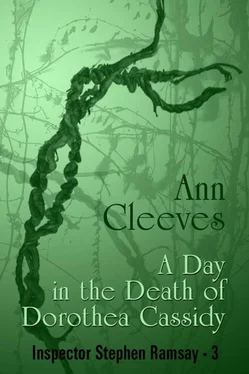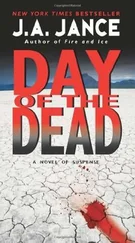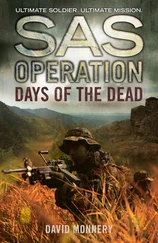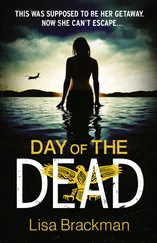Ann Cleeves - A Day in the Death of Dorothea Cassidy
Здесь есть возможность читать онлайн «Ann Cleeves - A Day in the Death of Dorothea Cassidy» весь текст электронной книги совершенно бесплатно (целиком полную версию без сокращений). В некоторых случаях можно слушать аудио, скачать через торрент в формате fb2 и присутствует краткое содержание. Жанр: Детектив, на английском языке. Описание произведения, (предисловие) а так же отзывы посетителей доступны на портале библиотеки ЛибКат.
- Название:A Day in the Death of Dorothea Cassidy
- Автор:
- Жанр:
- Год:неизвестен
- ISBN:нет данных
- Рейтинг книги:5 / 5. Голосов: 1
-
Избранное:Добавить в избранное
- Отзывы:
-
Ваша оценка:
- 100
- 1
- 2
- 3
- 4
- 5
A Day in the Death of Dorothea Cassidy: краткое содержание, описание и аннотация
Предлагаем к чтению аннотацию, описание, краткое содержание или предисловие (зависит от того, что написал сам автор книги «A Day in the Death of Dorothea Cassidy»). Если вы не нашли необходимую информацию о книге — напишите в комментариях, мы постараемся отыскать её.
A Day in the Death of Dorothea Cassidy — читать онлайн бесплатно полную книгу (весь текст) целиком
Ниже представлен текст книги, разбитый по страницам. Система сохранения места последней прочитанной страницы, позволяет с удобством читать онлайн бесплатно книгу «A Day in the Death of Dorothea Cassidy», без необходимости каждый раз заново искать на чём Вы остановились. Поставьте закладку, и сможете в любой момент перейти на страницу, на которой закончили чтение.
Интервал:
Закладка:
Clive stood up suddenly.
‘I’m going back to work,’ he said. ‘To Armstrong House.’
They heard the front door bang and saw him lope past the window on the way to town.
‘I should go too,’ Hilary Masters said. That decided Ramsay. He could not sit there, waiting, all afternoon. He put out a general alert for Corkhill on his personal radio and asked her to give him a lift back to the police station.
That afternoon Northumberland bus drivers went on strike after a dispute about overtime. Walter Tanner waited at the bus stop at the entrance of the Ridgeway for an hour before he realised that no bus was going to come. He was unused to vigorous exercise and the prospect of walking home dismayed him. The elation of his time at the bookmaker’s had long since left him. It was three o’clock. The boys from the High School, let out early because it was carnival Friday, were wandering back to the estate in an aimless, can-kicking, gum-chewing group. Tanner waited until they passed before starting off down the hill to the town. Their undirected aggression frightened him.
It was very hot still and he felt his face burn with the exertion of walking. The road into town was busy with traffic but there were no pedestrians and he was grateful at least for that. At last he came to the streets which were more familiar to him. Close to home, on a corner, a large public house was open. People holding long glasses were sitting in the garden under striped umbrellas. Tanner was tempted for a moment to go inside, to find a dark corner, to sit and recover his composure with a pint of beer, but he knew he was in no state to meet anyone. It would be better, after all, to go straight home.
At the door he stood for a moment, his muscles trembling, almost faint. He felt in his trouser pocket for his keys and pushed one into the keyhole. He tried to turn it with shaking fingers before realising that the door was already unlocked. In the shock of finding Dorothea’s car he must have gone out with the door still open. It hardly mattered. There was nothing inside worth stealing. He shut the door behind him and stood, breathing deeply, enjoying the cool of the house and the relief of being home.
Never again, he thought automatically. No more gambling. That must be the last time.
But as he began to relax he was already trying to find ways around the self-imposed ban. I could arrange everything on the telephone, he thought, though he knew he would miss the excitement and companionship which was as much part of the addiction as the thought of winning. I could just go on the big days.
He sat heavily on the bottom of the stairs and took off his shoes. One of his socks had a hole in the heel and his skin was red and blistered after the walk. He padded into the kitchen, filled a kettle and set it on the gas stove. While he was waiting for it to boil he went upstairs to swill his hands and face.
He knew when he reached the top of the stairs that someone had been into the house because the bathroom door was open. With an instinctive embarrassment he always shut the bathroom door.
‘Hello!’ he shouted. ‘Is anyone there?’
He thought the police might be back. He had a vague idea that scientists came and did tests. There was no reply and he walked on into the bathroom.
Clive Stringer lay in the grimy bath in a pool of blood. He was curled like a child with his knees almost up to his chin. He had been stabbed in the back and his wrists had been cut.
It was too much for Walter Tanner. The boy had been haunting him all day. Downstairs the kettle howled. He stood quite still. It was like a nightmare.
Chapter Eleven
At the Walkers’ house in the country the Cassidys were treated as invalids. Mrs Walker even wanted to make them soup for lunch. Soup was comforting, she said. But her husband, a retired major with a limp and a surprisingly boyish face, would not hear of it.
‘In this heat?’ he said. ‘Don’t be ridiculous!’
So she made one of her special salads, with strawberries for dessert, then took the meal into the garden for them on a tray. There the Cassidys sat on white wooden chairs in the dappled shadow of a willow tree, stunned and bewildered, unable to move. In the background was the house, square and white with a dovecote and stables and beyond that a wood where pheasants were reared. Major Walker was something big in the County Landowners’ Association and in feudal Northumberland he was treated as a squire.
When the meal was over the Walkers tactfully left the Cassidys alone and returned to the house. They watched the father and son through open french windows.
‘Poor things,’ Dolly Walker said. ‘Poor dear things.’ She was a magistrate and her husband often told her she was too soft to sit on the bench. Sometimes, after a day in court, she would come home and cry at the stories she had heard.
‘Yes,’ he said. ‘It’s been a terrible shock.’ But he was disturbed to find that he was not as shocked as he should have been and that there was an uneasy sensation of relief. Now things could get back to normal again. Dorothea had been tremendous, of course. She had brought a breath of life to the whole church. What did his wife call it? A spirit of renewal? But there had been something unsettling about Dorothea. All that waving of her hands in the air during the singing of the hymns had unnerved him. He would never say anything to Dolly who had become quite a new woman since Dorothea Cassidy had arrived, but he felt that there was something pagan in such exhibitionism. Perhaps she had spent too long in Africa.
Then there was the tension between Dorothea and Walter Tanner. The Major had never got to the bottom of Walter’s problems. Walter was not the sort to confide and it had seemed wrong to pry. He was not a sensitive man and had never been aware of Walter’s simmering resentment about the sharing of church wardens’ responsibilities, but the grocer’s hounded, haunted look in Dorothea’s presence touched Major Walker deeply. He would have liked to offer Walter help, but after a relationship of distant politeness he was not sure how to go about it.
‘I’d almost say Patrick was taking it worse than his father,’ Dolly Walker said tentatively. She was usually good about people but too diffident to trust her own judgement. She was afraid of her husband’s sarcasm. ‘He’s not mentioned Dorothea since he arrived. I hope he doesn’t feel responsible. People do, you know, quite irrationally at times like these.’
She was taking psychology A-level at evening classes and felt almost an expert.
‘Don’t be ridiculous!’ Major Walker said again. But as he looked out at the boy he could see what she meant. Edward Cassidy was limp and exhausted and wept openly, but Patrick sat gripping the arms of his chair and staring ahead of him with a rigid intensity.
There was something about the boy which irritated Major Walker. He thought the display of emotion must be a show. Dorothea was only the stepmother. They had not known each other very long. If she had been his natural mother the grief would be understandable. The Walkers had never had children and the Major had a sentimental view of the parental relationship. He thought Patrick should have more self-control. Two years of National Service would make a man of him, he thought, but he said nothing. Dolly would accuse him of being heartless.
The Walkers had gone back to the house ostensibly to fetch more wine and now they filed back over the grass towards the Cassidys, the Major in front carrying the wine in a bucket of ice. Like Beech, he thought. At Blandings. He was a great Wodehouse fan and the memory of the books came as a welcome relief.
The remains of their meal were still on the table. Edward Cassidy had hardly eaten anything, though he had drunk several glasses of wine very quickly and now when he spoke his words were a little slurred and incoherent. Patrick had seemed ravenous, pushing forkfuls of food into his mouth in silence, then wiping his plate with a piece of bread. Dolly fussed and gathered the dirty plates on to a tray. The Major stood to open the wine and was about to draw the cork from the bottle when Patrick Cassidy got suddenly to his feet, rocking the unsteady garden furniture, making the glasses rattle dangerously.
Читать дальшеИнтервал:
Закладка:
Похожие книги на «A Day in the Death of Dorothea Cassidy»
Представляем Вашему вниманию похожие книги на «A Day in the Death of Dorothea Cassidy» списком для выбора. Мы отобрали схожую по названию и смыслу литературу в надежде предоставить читателям больше вариантов отыскать новые, интересные, ещё непрочитанные произведения.
Обсуждение, отзывы о книге «A Day in the Death of Dorothea Cassidy» и просто собственные мнения читателей. Оставьте ваши комментарии, напишите, что Вы думаете о произведении, его смысле или главных героях. Укажите что конкретно понравилось, а что нет, и почему Вы так считаете.












